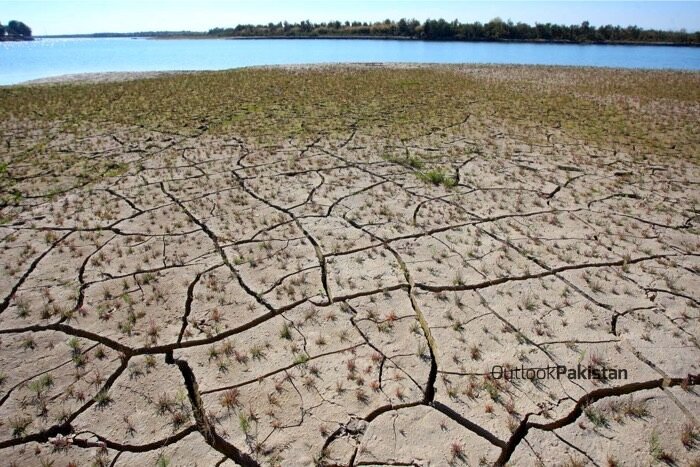Amir Sajjad is a farmer living in village Chak No. 28 B-C, Bahawalpur. He and his fellow farmers were quite unfortunate this year, as their wheat crop was considerably decreased by almost forty percent against last year.
Amir recalls, ‘Last year, we were able to harvest 40-50 pounds per acre, but this time we have reaped only 30-35 pounds per acre. I hoped to reap 650-700 mounds of wheat from my 14 acres of land but was able to harvest only 335 pounds this year. Our lives are badly affected due to less crop yield.’
During the past few years, Amir is witnessing changes in weather events. ‘Early summer accompanied by unpredictable rainfalls and hailstorms proved detrimental for the crop. Size of the spike and grains have also decreased this year, which shall further affect our incomes.’
Amir and his fellow farmers are not alone in this, as they stand amongst millions of those farmers in Pakistan whose livelihood is severely affected by changes in weather patterns but the government seems to be ignorant in this regard.
The ambiguity that whether climate change is Affecting Agriculture in Pakistan is rightfully answered by WWF-Pakistan. Their recent study titled Climate Change Adaptation in the Indus Ecoregion: A Micro-Econometric Study of the Determinants, Impact, and Cost-Effectiveness of Adaptation Strategies has proved that agriculture in Pakistan is getting affected by climate change.
The Micro-Econometric Study
The report has highlighted that losses up to 8 to 10 percent, equivalent to PKR 30,000 per acre, are expected across all crops (except rice). The report has also given on-farm adaptation measures, which can help increase crop yield up to 49 percent for wheat and 52 percent for cotton.
By translating such scientific information into policy and later disseminating among farmers, through farmer field schools, can significantly help the agriculture sector adapt to climate change and alleviate the problem of food security as well as poverty.
Unfortunately, the impacts of climate change are evident not only in the agricultural plains of Punjab and Sindh but also in the fragile mountain and coastal ecosystems where survival is much difficult owing to increase in the frequency of extreme weathering events and their impacts.
A tale from the Mountains
Darkut valley situated in Ghizer district of Gilgit-Baltistan is suffering from changing weather patterns. The National Disaster Management Authority’s (NDMAs) Winter Contingency Plan has classified Darkut as ‘one of the most vulnerable valleys’ for floods, avalanches, landslides, and Glacial Lake Outburst Flood (GLOFs).
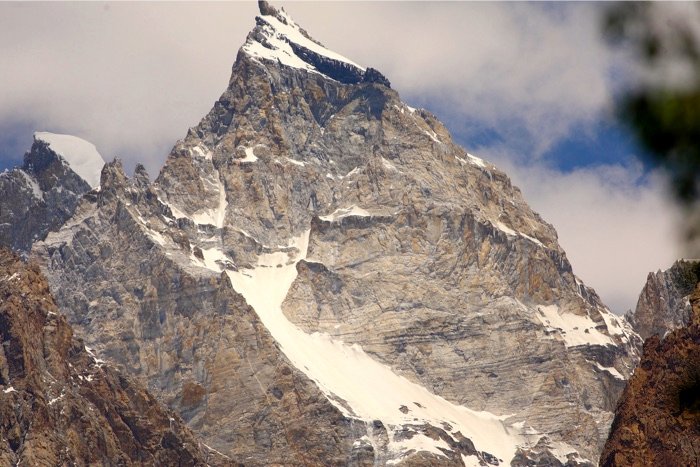
The valley has a population of 3000 people living in 300 households, amongst which most of them are women, children, and elders, wherefrom majority of the men have moved to other areas in search of bread and butter to feed their families behind.
During a recent media exposure visit to Darkut valley, organized by WWF-Pakistan, it was revealed that the communities are witnessing a considerable increase in the frequency of floods since 2010, thus severely affecting their lives, livelihoods, and property.

Karim Murad, aged 50, is a teacher by profession in Darkut valley and he confirms drastic changes in climate over the period of time which not only shifted the cropping patterns but also the quantity of the produce. “20 years ago there was no crop in September, but now we reap crops in this time period even, thus showing a change in temperature”.
“Moreover, the crop yield has considerably reduced, as our parents used to tell that they reaped five to six pounds wheat from one kanal of the land, but now we can reap two to three mounds wheat from one kanal,” Karim said.
When asked about an increase in extreme weathering events in the valley, Karim told,
“Since 2010 we are witnessing regular land slidings and floods almost every year, which has become a big issue for us”.
“Those who were financially stable, have migrated to other parts of Gilgit-Baltistan in search of better living and livelihood but those who couldn’t afford are still here and bearing the brunt of natural disasters every year.”
Out-migration of villagers from Darkut is perhaps the first incident of its kind; we may call climate migration, in Pakistan, Dr. Babar Khan, Head (GB) WWF-Pakistan said, which appear to increase and get intensified further with the passage of time as the negative impacts of changing climate on fragile mountain ecosystems, particularly on hanging glaciers and frail snow mass, are yet to be managed.
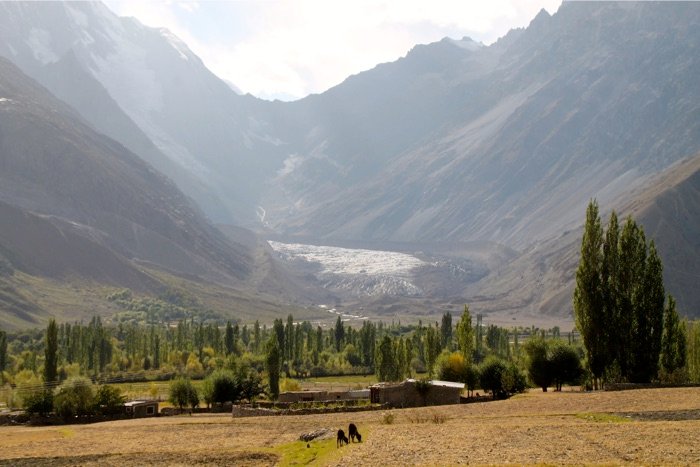
A tale from the coast
Ilyas Perozani, a resident of Sajanwari village, is a local farmer and owns 300 acres of land. A farmer possessing that much land holdings is believed to be a successful one, but the situation is quite the opposite. Luck doesn’t seem to be in his favor, as he cannot grow anything on his land owing to lack of freshwater and salinity, increased cyclonic activity and sea intrusion.
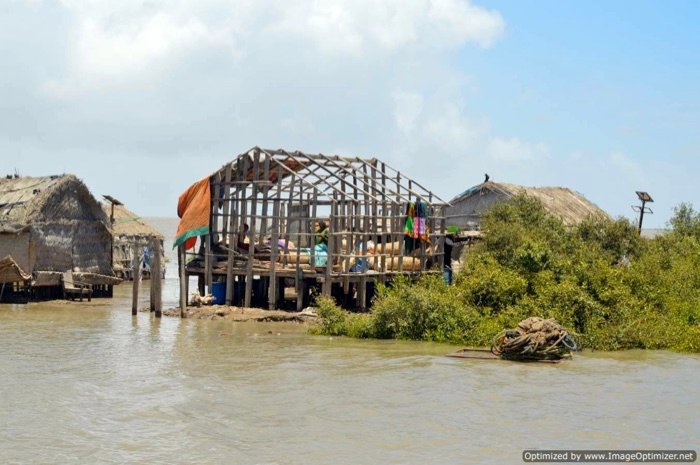
Only five percent of his land is cultivable so far, but that isn’t sufficient enough to make his both ends meet. When asked from Ilyas about any compensation given to him by the government, he added, “The government has given me no compensation in response to the losses I’m constantly facing climatic vulgarities. I find it hard to make a living from agriculture, therefore left with no other option but to switch to fishing.”

Pakistan – A Climate Affected Country
German Watch Institute, a German think-tank, has highlighted our vulnerability to climate change in the form of extreme weathering events. The study has developed a Climate Risk Index for 2012: the 10 most-affected countries, which identifies Pakistan as the third most affected country from climate change, after Haiti and the Philippines.
It further says that Pakistan witnessed the biggest loss to its economy, a staggering figure of over USD 6 billion, equivalent to one percent of GDP.
COP21
Today the world takes climate change as a threat to its survival, therefore to adapt and mitigate this phenomenon, leaders from more than 190 countries of the world will join heads in Paris, France, this year in December to chalk a global agreement on climate change.
Famously known as COP21, the conference aims to reach an agreement to reduce Greenhouse Gas Emissions (GHGs) to limit the global temperature increase to 2 degrees (pre-industrial level).
This makes COP21 more critical than any other universal conventions, as the fate of the planet will be decided. The agreement will come into force after 2020, and its importance for the nations is not to reach a legally binding treaty but also to implement it in spirit and soul to avoid dangerous climate catastrophes around the world.
Role of Ministry of Climate Change in Adaptation and Mitigation
After the 18th Amendment, The Ministry of Climate Change (MOCC) is a policy-making entity, therefore engaged with federal and provincial government departments and non-governmental organizations (NGOs) to incorporate climate change adaptation and mitigation plans to withstand the deleterious impacts of climate change.
When asked from Saleem Sheikh, Deputy Director Media, and Communications, Ministry of Climate Change regarding COP21, he said, “Pakistan is the least contributor to climate change, as its emissions are less than one percent but most affected by its impacts.
Therefore on COP21, Pakistan will press on rich countries to pay for damages caused due to extreme weathering events. These countries will also be pushed to transfer clean energy technology to Pakistan so that we can start developing solar and wind technology indigenously.”
Exploring the Green Climate Fund (GCF)
Pakistan has already conveyed to the international community that it is severely getting affected by floods, GLOFs, sea-level rise, and cyclones. To adapt to climate change, the MOCC has submitted multiple proposals to GCF for getting funding for their implementation.
A Climate Change Workshop
A couple of days back, I had a chance to participate in a workshop organized by Heinrich-Böll-Stiftung (HBS) titled Introduction to COP21, which focused on building the capacity of environmental journalists on climate change. HBS, a German political non-profit organization working on ecology and sustainable development planned to raise awareness regarding climate change in Pakistan, therefore organizing a series of workshops on COP21 in this regard.
It was a great learning experience having climate change experts from various organizations across Pakistan including the Ministry of Climate Change (MOCC); International Union for Conservation of Nature (IUCN); Sustainable Development Policy Institute (SDPI); Centre for Climate Research and Development (CCRD), COMSATS and the French Embassy.
The workshop started with a note by Nathalie Dupont, Political Counselor, French Embassy, who urged the media participants to highlight the importance of climate change, especially COP21 in Pakistan.
“Pakistan stands amongst the most vulnerable countries to climate change. Unfortunately, we are the generation most affected by it, and our future generations are likely to bear its worst impacts. Adaptation and mitigation to climate change should be the priority of Pakistan so that its population can be protected from the adverse impacts.”
Regarding COP21 she told that it’s far more critical than previous COPs. It was the first time in 1992 when the United Nations (UN) alerted nations about global warming. This year is 21st COP since then.
‘This December a new climate agreement will be signed, and all countries have to agree on this global agreement which will be implemented after 2020. The 5th report by Intergovernmental Panel on Climate Change (IPCC) has already said that the world has to keep global warming to two degrees (pre-industrial level) to avoid dangerous climate catastrophes around the world.’
Nathalie also told that they aim to sensitize people on climate change and COP21 in Pakistan so that they take these issues as a threat to their survival. ‘Of course, Pakistan is experiencing an increase in the intensity and frequency of extreme weather events; therefore awareness is the key to make people aware of these issues, their causal factors, and remedies.
Moreover, the French government is willing to release the Green Climate Fund (GCF) of approximately 100 million dollars to climate affected countries so that adaptation and mitigation can take place.’
The director of Heinrich-Böll-Stiftung, Marion Regina Mueller, hoped that this agreement would help to adapt and mitigate climate change in Pakistan. ‘We want to address the discussion about climate justice, which requires social and political debate and a fundamental shift in our economic system.
Since the pressure is immense to reach a tangible agreement on climate change, it is expected from COP21 that it will deliver what the world (instead “what the people who are affected most by climate change impacts”) wants.’
Malik Amin Aslam, Vice President, IUCN, and Chair of the Green Growth Initiative in KPK province who has also been a lead member of Pakistan’s negotiating team on climate change also briefed media participants regarding the impacts of climate change in Pakistan and across the planet.
‘Climate science is now indisputable, the economic costs of climate impacts are directly impacting countries, and the physical reality of the issue is being felt across the world in the form of increased floods, freak weather patterns, and rising sea levels. Unfortunately, the only issue lagging behind all this is the political process, which remains mired in endless and fruitless negotiations.
Malik Amin further told that Pakistan is a very low contributor to the problem of climate change with minimal greenhouse gas emissions but still remains one of the most impacted and vulnerable countries.
We are definitely at the receiving end of climate injustice – facing the heat while contributing very little to the issue.
It is not about what the world wants from Pakistan but what Pakistan demands from the world to cope with this inescapable reality for us.
We are into an age of forced adaptation in Pakistan and have to cope with yearly floods, freak weather events, melting glaciers, bursting glacial lake outbursts and a shifting monsoon pattern – all of which is impacting our economy to the tune of U$6 to U$ 14 billion per annum and creating millions of climate refugees every year’ he added.
Ambassador Retd. Shahid Kamal, Advisor to CCRD, COMSATS also briefed participants regarding the implications of climate change in Pakistan and regarded climate change as a Complex Subject. ‘We have to simplify the issue to raise awareness. Carbon emissions are increasing in the atmosphere, and the results can be devastating; therefore, it is imperative to mainstream climate change adaptation in Pakistan’, he added.
When asked from Shahid Kamal what corporates can do to adapt and mitigate climate change impacts, he said, ‘We have to move towards a low-carbon economy by urging business leaders to make their processes sustainable. Such actions will not just reduce our emissions but also our dependence on natural resources.’
2015 – the Worst year for Pakistan
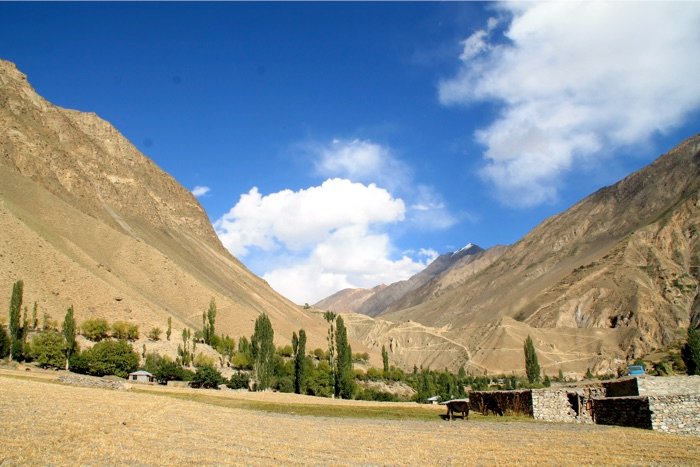
2015 has proved to be the worst year for Pakistan, as a tornado in Peshawar killed 44 people, heatwaves in Karachi killed over 1,500 people and recent floods in Pakistan killed 233 and affected 1,572,191 people. The economy has suffered a tremendous blow due to such weathering events.
COP21 which is scheduled to take place in Paris, France holds immense importance for every one of us, as it will help to take measures for climate adaptation and mitigation and to present a much-needed case in front of the global community that Pakistan despite being a low contributor of Greenhouse Gas Emissions (GHGs) is most affected by climate change.
To stop human-induced climate change, Pakistan should implement adaptation and mitigation measures on war-footing grounds, as we don’t have time to wait for the climate agreement to be signed by this year’s end and implemented by 2020, as the five year’s gap can further push us to dangerous climatic catastrophes. The only stakeholder not negotiating is Nature, which is not waiting for us to act. However, climate mitigation and sustainable development can go hand in hand, provided the right strategic focus, and political commitment is present.
The writer has an interest in climate change, water, food security, and sustainable development. He tweets @SyedMAbubakar
